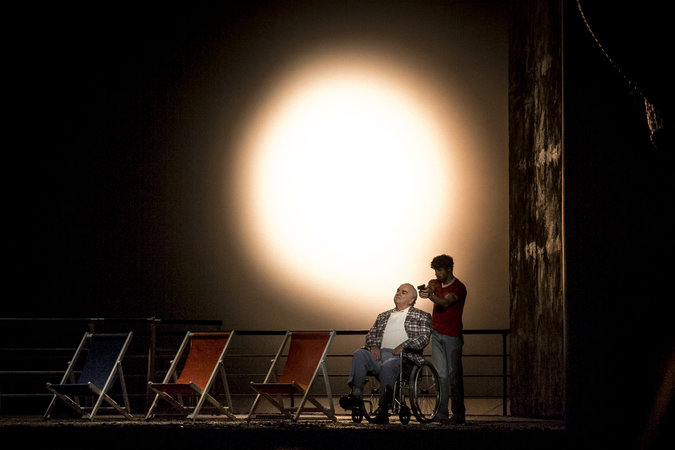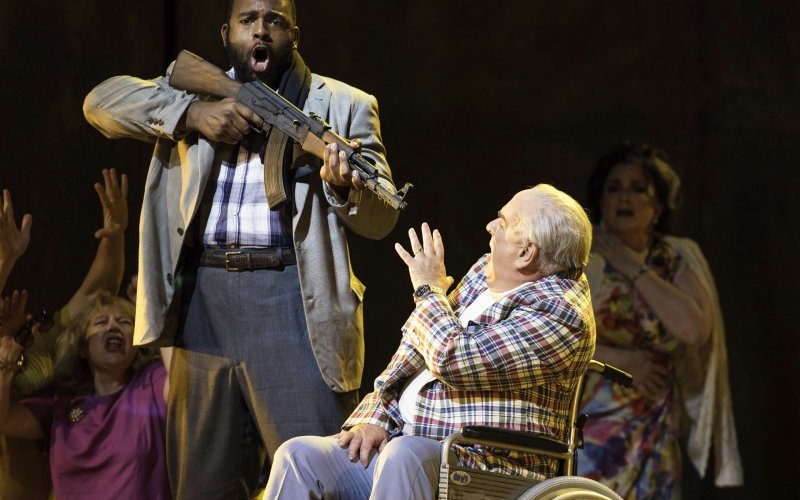I really enjoyed the opera, even though it had some issues: too many in-and-out characters, structural problems like awkward transitions, and a few lulls in the score. But I did not find it to be even remotely anti-Semitic, as so many have asserted. (Coincidentally, I am reading Dickens’s Oliver Twist right now, and if anyone needs clarification on anti-Semitism they should revisit the Fagin character in that!) The opera, with music by John Adams and a libretto by Alice Goodman, concerns a real-life tragedy: the 1985 terrorist hijacking of the cruise ship the Achille Lauro which culminated in the heartless murder of a wheelchair-bound American Jew, Leon Klinghoffer, by members of the Palestinian Liberation Front. The polemic around the production began before the opera even premiered at the Met, when General Manager Peter Gelb was pressured to cancel the proposed televised broadcasts of the work. A strongly worded condemnation of the opera by Leon and Marilyn Klinghoffer’s daughters, Lisa and Ilsa, is included in the Met’s program notes too. But Klinghoffer and uproar are old friends by now, for there was much ado when the opera first premiered in America at the Brooklyn Academy of Music in 1991 as well. This controversy was examined (and the opera defended) in an essay by Robert Fink called “Klinghoffer in Brooklyn Heights” and published in the Cambridge Opera Journal in 2005—read it here.
I feel compelled to dispel the anti-Semitic charges lobbed at Klinghoffer this time around, for they are completely unfounded and I think it is a powerful work that deserves a place in the repertory. The fact that the story is true makes it all the more emotionally wrenching, so I could certainly
A frequent complaint made against the opera is that it glorifies the terrorists; and that by keeping the story alive their evil lives on too. This is a completely bogus charge. First of all, the abject denial of a terrible event is far more dangerous than the remembrance of a terrible event—thankfully everyone seems to agree about this in relation to the Holocaust. Also, in the opera the real names of the victims are used but the names of the terrorists have been changed—thus the real Leon Klinghoffer’s bravery is perpetuated while the real terrorists’ names are stricken from the historical record. And the very title of the opera focuses on Leon’s principal significance. Furthermore, the terrorist who actually kills Leon in the Met’s production is portrayed by a dancer and not a singer—so the murderer is rendered literally voiceless in this treatment. My boyfriend joked to me at intermission, “I always knew modern dance was a form of terrorism.” He was kidding of course, for several modern pieces are among his favorite dance works, but some people have read into this opera in so many ridiculous ways that it was a fitting wisecrack.
Lisa and Ilsa’s program note contends that the opera, “rationalizes, romanticizes, and legitimizes the terrorist murder of [their] father.” I completely disagree with this statement. For one thing, the murder is shown as highly irrational. It is portrayed as an impulsive act made by a deeply disturbed and brain-washed young man. Through dance sequences (with choreography by Orlando Pita) during the Night Chorus and the Aria of the Palestinian Woman we see Omar, the eventual murderer, being inculcated in fundamentalist doctrine. He is told that martyrdom is his only honorable option. ISIS is chillingly evoked during these scenes as well as in the Chorus of the Exiled Palestinians. People have complained about the sympathetic portrayal of the terrorists, but they are hardly likeable. One named Mamoud is momentarily humanized (through beautiful singing by Aubrey Allicock in his Met debut) when he tells the ship’s captain about his love for music. But when the captain—a wonderful Paulo Szot—tells him that if he could say that to his enemies they might achieve peace, Mamoud instantly recoils into his default mode of hate. In the end they are all depicted as angry zealots.
The portrayal of the terrorists throughout Klinghoffer reminded me a little of the way the terrorists were drawn in the 2013 film Captain Phillips. In that movie the terrorists are shown as people who are desperately trying to find a way out of an impoverished existence. But though they have no ostensible options for bettering their situation, the film makes it clear that choosing an immoral and destructive path is never an excuse. Barkhad Abdi, who plays the lead terrorist in Captain Phillips, does a fantastic job of making his villainous character nearly sympathetic at moments. The terrorists in Klinghoffer—even the dreamy Mamoud—are not quite as nuanced, but the general effect is similar. While the Jews are both individually developed and also sympathetic as a group, the Palestinians are not. This is apparent from the opera’s opening choral diptych: the singers in the Chorus of the Exiled Jews chant about rebuilding their homeland while they plant trees all over the stage (their recurrent motif); while the Chorus of the Palestinians is purely about demolition and revenge. The Palestinians are actually the stereotyped group here—they are stripped of individualized humanity and represented as a unified block of hate.
Another charge fired at the opera is that the Palestinians get the “better” music. I would say that they get the more exciting and bombastic music, but Leon and Marilyn Klinghoffer are given some truly lovely arias. (In his essay, Robert Fink explains that Leon gets all the hagiographic music.) I thought that Michaela Martens as Marilyn Klinghoffer was superb. She was especially poignant in her lamentation aria that closes the production (and gives her grief the last word). As Leon Klinghoffer, Alan Opie did a nice job of the Aria of the Falling Body too. All of the evening’s singing was strong, and I find it somewhat ironic that this opera, with its reputation for slander and protest, provides the biggest platform of the season for singers of ethnic minorities. If it takes embodying villainous terrorists to get Aubrey Allicock, Ryan Speedo Green, and Sean Panikkar onstage together so be it. Maybe in operas to come they can play heroes.
Overall, the opera has an unsettling, absurdist feel about it. In two bizarre vignettes—one about an Austrian woman who hid in her room for the entire ordeal, one sung by a British Dancing Girl who pops up from a frozen position on the floor with a gun at her head and throws off her robe to display a Vegas showgirl getup—the show becomes darkly comical. The plot does not flow either: it jumps around from flashbacks to the present, the Klinghoffers surprisingly don’t sing much until the second act, and the terrorist chain-of-command is scattered and confusing. The title event—the killing of Leon Klinghoffer—is done onstage, but with most of the characters offstage. So Marilyn and the Captain learn later, and rather anticlimactically, about what has happened. In the penultimate scene of the show the tourists (costumed in gaudy Hawaiian shirts and other garishly attire) and crew of the ship gather together on deck to wave goodbye to the disembarking terrorists, for at that point only the captain knows that there has been a murder. It is all quite strange, but the disjointedness of the piece is symbolic of the tragic absurdity of the entire event.
The boat was in complete turmoil, and no one had a hold on the situation. Marilyn did not get any closure, and Leon died alone and defenseless for no apparent reason other than ages-old odium. Of course both sides have specific grievances and reasons for their loathing, but this is a work of art and it is not going for historical accuracy. From the opening juxtaposition of choruses (both accompanied by a litany of flashing years projected onto the backdrop signifying the long history of this discord) the opera is trying to say something much more general and penetrating about perpetually antagonistic neighboring peoples. Like the Hatfields and McCoys or the Montagues and Capulets, this opera posits that the Israeli-Palestinian history of violence is too long to make sense of anymore. That an innocent, disabled tourist could be killed in the name of this timeworn conflict exposes the inanity and ineffectiveness of such ingrained hatred. There is no justification, or even a good explanation, for what happened to Leon Klinghoffer, which is why I think the event practically begs for artistic interpretation. It is something we need to ponder, and I am so grateful that I live in a country in which this opera can be openly performed, examined, debated, and yes, even protested.



 RSS Feed
RSS Feed